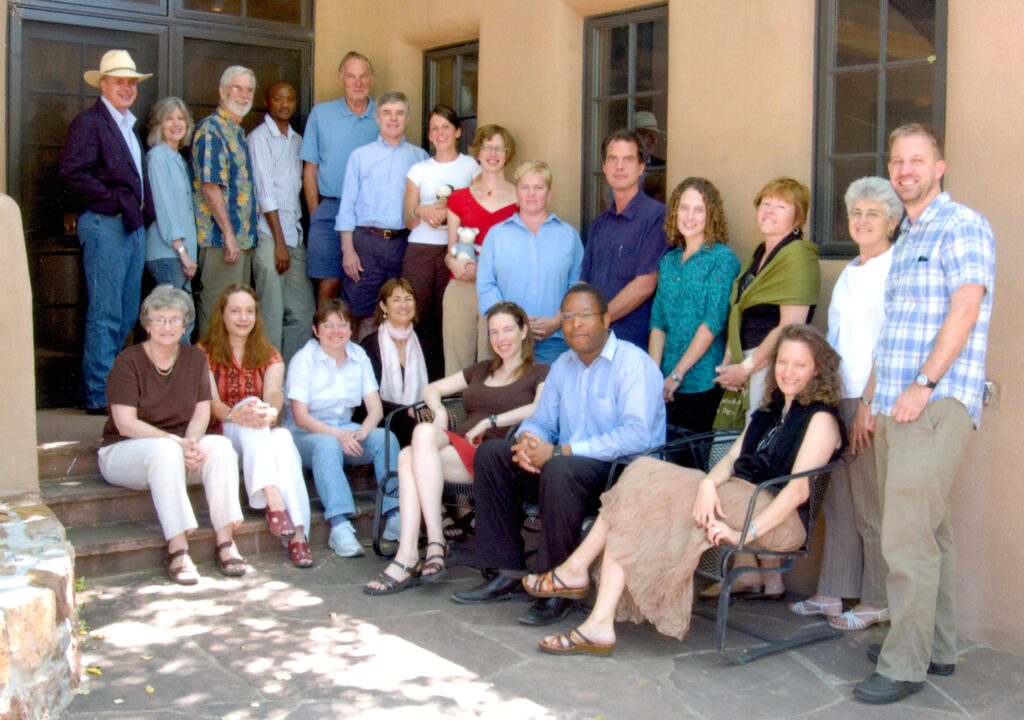Corporate Lives: New Perspectives on the Social Life of the Corporate Form
Date
Aug 21-27, 2008Organized by
Rebecca D. Hardin, Damani Partridge and Marina WelkerLocation
School for Advanced Research, Santa Fe, New MexicoPublications
Corporate Lives: New Perspectives on the Social Life of the Corporate Form Current Anthropology, Vol. 52, S3, April, 2011.Participants
- Leslie C. Aiello Wenner-Gren Foundation, USA
- Steven J. Bohlin School for Advanced Research, USA
- James F. Brooks School for Advanced Research, USA
- Bená Burda Maggie’s Organics/Clean Clothes, Inc., USA
- Jessica R. Cattelino U. California-Los Angeles, USA
- John Conley U. North Carolina, USA
- Susan E. Cook Office of the King, Royal Bafokeng Nation, South Africa
- Catherine Coumans Mining Watch Canada
- Krista Gullo U. Michigan, USA
- Jane Guyer Johns Hopkins U., USA
- Rebecca D. Hardin U. Michigan, USA
- Sarah Lochlann Jain Stanford U., USA
- Jane Lynch U. Michigan, USA
- Sally Engle Merry New York U., USA
- Thabo Mokgatlha Office of the King, Royal Bafokeng Nation, South Africa
- Robert A. G. Monks Lens Governance Advisors, USA
- Damani Partridge U. Michigan, USA
- Gabriela Vargas-Cetina U. Autónoma Yucatan, Mexico
- Marina Welker Cornell U., USA
- David Carrico Wood Boston College Center for Corporate Citizenship, USA
- Michael Woodard Jubilee House Community, Nicaragua
ORGANIZER’S STATEMENT:
This symposium emerged from our interests in how corporations are increasingly taking on roles typically associated with nation-states, shaping governance, and managing daily life. Thanks to the support of a pioneering collaboration between the Wenner-Gren Foundation and the School for Advanced Research, we brought together anthropologists and corporate practitioners from a wide range of institutions and career paths both within and beyond the academy, including corporate leaders, financial planers, shareholder activists, environmental and labor advocates, and NGO consultants. Over six days of intense discussion and informal debate, it became clear that older concepts, such as public sphere, private sector, or state and civil society, are inadequate to understand the nexus of NGO, corporate, nation-state, and community connections that are progressively shaping contemporary lives.
As we convened, the ramifications of real estate and financial market slides were increasingly appearing in media narratives of crisis that ranged from apocalyptic imaginings of global meltdown to intimate personal tales of the hardships and agonizing decisions that come with job loss and evaporating retirement savings. As organizers, we felt that expanding our contributions to social studies of corporations was a relevant and urgent task. We were interested in developing an intellectual toolkit that not only attended to these shifts related to global financial markets and corporate formations, but also to our personal and bodily investments in them.
In sessions on Autobiographical Insights, Genealogies of Corporate Forms, Reinventions of Corporations, Long-Range Governance, and Volatility, we identified six key directions for anthropological contributions to the study of corporate forms. We began by documenting the emergent trends and institutions that mark the current moment. As became clear in our discussion, corporate forms have become more widespread and varied, but so too have collaborations, alternatives, and movements of opposition. Second, we focused on the temporalities of corporations by committing to historical approaches and by attending to the implications of financial time horizons such as market cycles, and quarterly performance measures that govern corporate institutions. Although corporations have an air of immortality, we found that most are short-lived. Third, we aimed to develop a precise and conceptually powerful language for understanding corporate phenomena. This entailed carefully distinguishing between vernacular and analytic categories, cultivating an awareness of how we harness different linguistic registers in corporate fieldwork settings and academic writing, and noting where our terminology may fail us. We confronted these questions directly during sessions as we were compelled to explain and translate between different languages of specialization. Fourth, we asked what knowledge practices are associated with corporations, examining relations of expert knowledge production, the making and use of accounting metrics, and the structures of responsibility these metrics entail. Fifth, we attended to how corporations shape subjectivities, examining carefully the cultural practices, moral beliefs, and emotional investments that animate corporate executives, collaborating NGOs, as well as workers and consumers. Finally, we aimed to disaggregate the corporation by always keeping in sight the fact that corporate forms are imperfect social institutions, full of internal contradictions and competing agendas, rather than monolithic, rational, coherent, fully self-present and self-knowing actors.
Papers from the symposium along with commentaries that capture the dynamic of our dialogue are currently in preparation for a special issue of Current Anthropology. These papers draw on research and work experiences in such diverse contexts as Maggie’s Organics clothing line and women’s textile cooperatives in Nicaragua; the Royal Bafokeng Nation’s management of platinum extraction in South Africa; the social networks and branding of “survivorship” in cancer camps; Hewlett-Packard’s e-inclusion efforts from Silicon Valley to India and Costa Rica; logging companies and conservation organizations in the Congo basin of Africa; the Social Investment Forum; the World Bank’s Chad-Cameroon oil extraction project; and the Seminole Nation’s acquisition of Hard Rock International.
In the end, we hope that this will be the beginning of an open-ended, critically engaged, and far ranging discussion.
Current Anthropology supplement on the UCP website
Wenner-Gren Symposium #140
